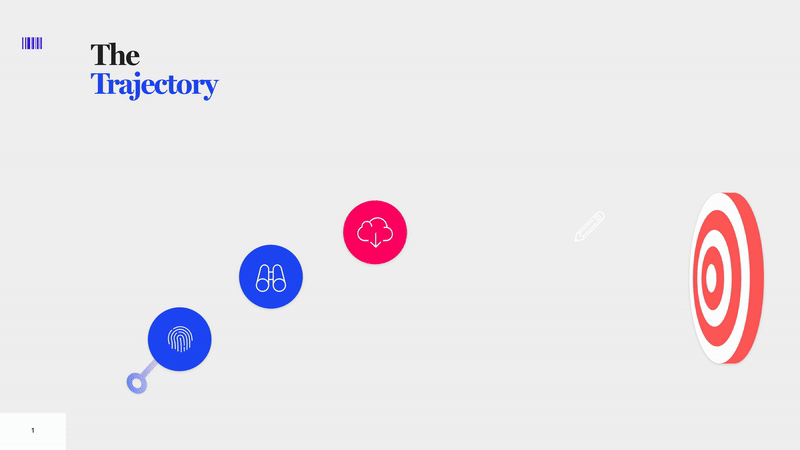Winning the Mind War: Why being different, is a losing game.
As we contend with an increasingly congested attention economy, leaders often turn to points of difference in order to distinguish themselves and their work.
That’s a mistake.
One that is increasingly costing leaders like us the mind war.
In everything from positioning organizational thought leadership to shaping comms in election campaigns (yes, this one too), leaders are leaning on an outdated model of relevance. And as the voices we want to hear are increasingly crowded out by the baying of the mob, whipped up into a frenzy of their darkest impulses, it is becoming increasingly important—in some cases existential—to understand what works today and what will work tomorrow.
Pardon the language
Look at that picture.
Unsettling isn’t it?
Any guesses as to why?
Turns out, it lacks distinction.
I know that may seem like semantics or just a cheeky thing to say; after all, it is distinctly uncomfortable to look at. But I do mean this literally.
There are a lot of different things in this picture. And those things are clearly different from each other.
But nothing is easy to identify or remember.
That’s what leads to that unsettling sense of disorientation.
”Tell me what makes you different” is a pretty ubiquitous experience for anyone or any thing with a brand. It can sting, but often the speaker means well. They want to know what makes you different from your peers. And for the longest time, that has been the gold standard in the attention economy.
If you are notably different from your peers, then you have attention allocated to you. Tale as old as time.
Except for when it’s not.
And the more crowded the attention economy is, the less true that tale becomes.
Distinction, on the other hand happens when something is easy to identify and easy to remember. From a scientific perspective, it’s what happens when these two things occur:
Something is memorable—can get past the brain’s filters into long term memory [1]
That same thing is stored in the right part of the human memory network—meaning it is associated with and connected to ideas relevant to the chain of behaviors you’re looking to influence [2].
So when we return to this picture, and assess it for distinctiveness, what we’re doing as asking whether (1) we can look at it and say, “oh yes, there’s an x in here, I’ve seen it before,” which means it’s easy to identify; (2) whether we will remember this thing three weeks from now, when we need to make a decision that’s connected to it; (3) whether we will do both of those things with ease?
It's about recognizability. And whether or not the thing in question is worthy of note.
And while that's something that can be established in a moment, it is often reinforced and learned and built over time
So, why doesn’t differentiation work?
Differentiation’s biggest weakness is the fact that it assumes you and your audience share similar frames of reference.
Here’s what I mean: in order to determine whether or not something is different from it’s peers, one first needs to be aware of said peers in the first place. As an expert in your field, this is part of the job. You’re great at this.
Your protagonists on the other hand are not.
They may not even have a clear idea of what your field is.
They certainly won’t be aware of the same set of peers you are, unless they are experts themselves.
This is what’s happening in academia.
When frames of reference are shared—as they are amongst academics— so too are ideas about who or what counts as a peer or contemporary.
In that scenario, differentiation becomes distinction.
Translation: when you share a frame of reference, the thing that makes you different from your peers IS the thing that is easy to identify and easy to remember.
When the frames of reference are different, well, you might be differentiated, but only from a point of reference your protagonists can't see.
Let’s say you run an alarm system company. As the expert, you’d see your peers as other alarm system companies. But our protagonists might see, a gun, a video doorbell, a locked box for a gun, keeping a low profile, or even, doing nothing as your peers. They may not even be considering other alarm system companies, let alone the ones you know to be actual contemporaries.
Differentiation’s second key weakness?
Being different doesn’t ensure that folks get what you do. And without that level of understanding in place, there’s nothing to ensure you’ll be remembered when it comes time to make a relevant decision.
Why does distinction work?
On the other hand, when something is easy to identify and easy to remember we generally also have a basic understanding of the purpose of the item in question. Not always. But when distinction is built with the intention of being cognitively useful, that basic understanding is usually present. So differentiation’s second weakness is sidestepped immediately.
Remember here our previous definition: it’s not enough for something to “get past the brains filters”—as something quirky or weird might also do. We have to be stored in the right part of the memory network so we can be associated with ideas relevant to the chain of behaviors we’re looking to influence.
And in case it hasn’t been clear until now, It’s entirely possible to be distinct for the wrong reasons—or in a way that isn’t cognitively useful. That includes everything from the super weird PR antics that one guy pulled off to the pall of confusion that can follow interesting, “but I’m not sure I totally get it” ideas. When that happens, folks often won’t remember you and your ideas or body of work when they’re making relevant decisions.
Ultimately, something is distinct when it is worthy of note, and so that also means that the frames of reference in question are not being informed by industry knowledge—like with differentiation. Rather they are being informed by your stakeholders and what they find easy to identify and remember.
And so differentiation’s first weakness is avoided.
When I work on refining distinction with underrecognized clients, I intentionally leverage the status quo—the thing their stakeholders are intimately familiar with—and the cognitive resistance/ballast that keeps the status quo in place in two ways:
Working with the cognitive resistance, how it tells their stakeholders the world works and reinforcing those perspectives e.g. social media is like screaming into a void, here’s how you can win anyway
Upending the cognitive resistance, Tai chi style, by using it’s power against itself e.g. Being everywhere all at once, can actually teach people to ignore you. Here’s why
That’s because underrecognition [4] requires a special touch.
If it is already the status quo to overlook and underappreciate someone’s ideas, leading only with the counterintuitive, status quo upending facets of that work doesn’t do enough to get those ideas on the cognitive map. Not with the state of the attention economy today. So do not make the mistake of believing that making something distinct is the same as making it “original.” It’s not. And if anything, the quest for originality should be avoided.
Pursuing distinction, as an underrecognized leader, means pursuing ownership over both the status quo busting facets of an idea and the status quo reinforcing elements of that idea.
…
An increasingly crowded attention economy has meant increasingly divided frames of reference. In some cases we have completely alternative perspectives on reality. As that trend continues, so too does the decline of differentiation and the outcomes it once allowed us to achieve. Instead, it grants us the discomfort and disorientation of the image we started this with. So if relevance is a quality you are looking to maintain as the seasons change and the world shifts around us, find your distinction. Pinpoint the facets of your work that are easy to remember and easy to identify and do so with the cognitive realities of underrecognition in mind.
Want a literal map to winning the Mind War?
——————————————————
[1] Scheunemann, L., Plaçais, P. Y., Dromard, Y., Schwärzel, M., & Preat, T. (2018). Dunce Phosphodiesterase Acts as a Checkpoint for Drosophila Long-Term Memory in a Pair of Serotonergic Neurons. Neuron, 98(2), 350–365.e5. https://doi.org/10.1016/j.neuron.2018.03.032
[2] Wilhelm, I., Diekelmann, S., Molzow, I., Ayoub, A., Mölle, M., & Born, J. (2011). Sleep Selectively Enhances Memory Expected to Be of Future Relevance. The Journal of Neuroscience, 31, 1563 - 1569. https://doi.org/10.1523/JNEUROSCI.3575-10.2011.
[3] Xie, W., Bainbridge, W., Inati, S., Baker, C., & Zaghloul, K. (2020). Memorability of Words in Arbitrary Verbal Associations Modulates Memory Retrieval in the Anterior Temporal Lobe. Nature human behaviour, 4, 937 - 948. https://doi.org/10.1038/s41562-020-0901-2.
[4] Nwangwu, N. C. (2023, April). Why we should stop saying underrepresented. Harvard Business Review. https://hbr.org/2023/04/why-we-should-stop-saying-underrepresented



